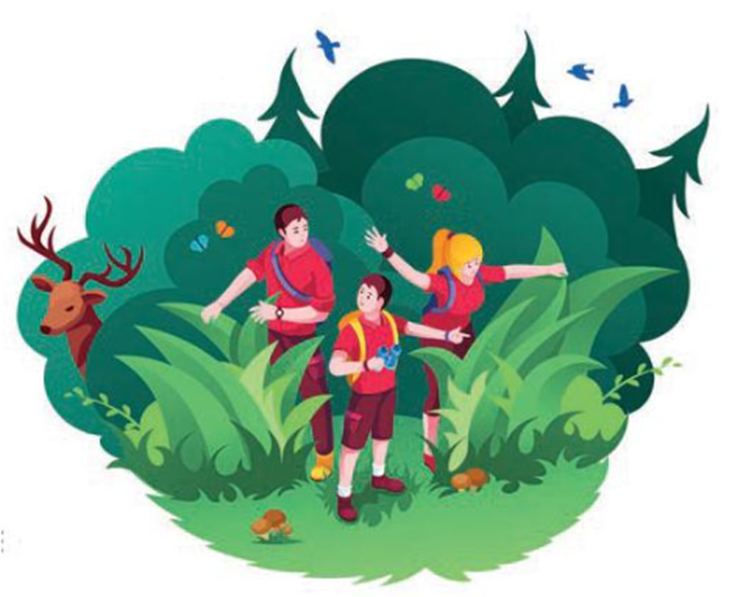Vocabulary
Choose the correct word to complete the conversation.
(Chọn từ đúng để hoàn thành đoạn hội thoại.)
Mai: Ms Hoa, what is (1) mass / sustainable tourism?
Ms Hoa: Well, the aim of this kind of tourism is to (2) protect / damage the environment, respect local culture, and keep (3) benefits / profits local.
Mai: Can you give me an example?
Ms Hoa: When travelling, we should not (4) litter / impact on the street. We should also be (5) aware / responsible of the local traditions and respect them.
Mai: So is this kind of tourism similar to (6) ecotourism / masstourism?
Ms Hoa: Well, it’s a form of sustainable tourism because it has a positive (7) impact / craft on the environment.

mass (adj): to lớn, đại chúng
sustainable (adj): bền vững
protect (v): bảo vệ
damage (v): làm hư hại
benefits: lợi ích
profits: lợi nhuận
litter (v): xả rác
impact (v): tác động
aware (adj): có nhận thức
responsible (adj): có trách nhiệm
ecotourism (n): du lịch sinh thái
mass tourism: du lịch đại chúng
craft (n): đồ thủ công

|
1. sustainable |
2. protect |
3. profits |
4. litter |
|
5. aware |
6. ecotourism |
7. impact |
|
Mai: Ms Hoa, what is (1) sustainable tourism?
(Thưa cô Hoa, du lịch bền vững là gì)
Ms Hoa: Well, the aim of this kind of tourism is to (2) protect the environment, respect local culture, and keep (3) profits local.
(À, mục đích của loại hình du lịch này là bảo vệ môi trường, tôn trọng văn hóa địa phương và giữ lợi nhuận cho địa phương.)
Mai: Can you give me an example?
(Cô có thể cho con một ví dụ được không?)
Ms Hoa: When travelling, we should not (4) litter on the street. We should also be (5) aware of the local traditions and respect them.
(Khi đi du lịch, chúng ta không nên xả rác ra đường. Chúng ta cũng nên biết về các truyền thống địa phương và tôn trọng chúng.)
Mai: So is this kind of tourism similar to (6) ecotourism?
(Vậy loại hình du lịch này có giống với du lịch sinh thái không ạ?)
Ms Hoa: Well, it’s a form of sustainable tourism because it has a positive (7) impact on the environment.
(À, đó là một hình thức du lịch bền vững vì nó có tác động tích cực đến môi trường.)
Pronunciation
Work in pairs. Role-play the conversation above. Try to use appropriate intonation.
(Làm việc theo cặp. Nhập vai vào đoạn hội thoại trên. Cố gắng sử dụng thành phần thích hợp.)

- Câu trần thuật thường có ngữ điệu xuống giọng ở cuối câu.
- Câu hỏi có từ để hỏi Wh- thường có ngữ điệu xuống giọng ở cuối câu.
- Câu hỏi không có từ để hỏi Yes-No thường có ngữ điệu lên giọng ở cuối câu.
Advertisements (Quảng cáo)
Grammar
Grammar
Put the verbs in brackets in the correct forms.
(Chia dạng đúng các động từ trong ngoặc.)
1. If I (be) ______ you, I (live) ______ with a host family so that I can learn more about the local culture.
2. If we (work) ______ together, we (be) ______ able to reduce the negative impact of tourism on the environment.
3. If we (allow) ______ more people to crowd the city centre, we (have) ______ to deal with environmental pollution in the future.
4. If we (have) ______ enough money, we (go) ______ on an ecotour to Finland. Instead, were staying in Viet Nam in the summer.


- Câu điều kiện loại 1 nói về những tình huống có thật ở hiện tại hoặc tương lai, mà chúng ta tin rằng nó có thể hoặc có khả năng xảy ra.
Cấu trúc: If + thì hiện tại đơn, … (will) …
- Câu điều kiện loại 2 nói về những tình huống giả tưởng mà không có khả năng xảy ra.
Cấu trúc: If + thì quá khứ đơn, … (would) …

|
1. were/was; would live |
2. work; will be |
3. allow; will have |
4. had; would go |
1. If I were you, I would live with a host family so that I can learn more about the local culture.
(Nếu tôi là bạn, tôi sẽ sống với một gia đình bản xứ để có thể tìm hiểu thêm về văn hóa bản địa.)
2. If we work together, we will be able to reduce the negative impact of tourism on the environment.
(Nếu chúng ta làm việc cùng nhau, chúng ta sẽ có thể giảm tác động tiêu cực của du lịch đến môi trường.)
3. If we allow more people to crowd the city centre, we will have to deal with environmental pollution in the future.
(Nếu chúng ta cho phép nhiều người tập trung hơn vào trung tâm thành phố, chúng ta sẽ phải đối phó với ô nhiễm môi trường trong tương lai.)
4. If we had money, we would go on an ecotour to Finland. Instead, were staying in Viet Nam in the summer.
(Nếu chúng tôi có tiền, chúng tôi sẽ đi du lịch sinh thái đến Phần Lan. Thay vào đó, họ ở Việt Nam vào mùa hè.)
Từ vựng
1.sustainable : (adj): bền vững
Spelling: /səˈsteɪnəbl/

Example: Well, it’s a form of sustainable tourism because it has a positive impact on the environment.
Translate: Đó là một hình thức du lịch bền vững vì nó có tác động tích cực đến môi trường.
2.profit : (n): lợi nhuận
Spelling: /ˈprɒfɪt/

Example: He sold his house at a huge profit.
Translate: Anh ta đã bán căn nhà của mình với một khoản lãi khủng.
3.similar to : (adj.phr): giống
Spelling: /ˈsɪmɪlə tuː/
Example: Paul is very similar in appearance to his brother.
Translate: Paul có ngoại hình rất giống anh trai mình.
4.deal with : (v.phr): đối phó với
Spelling: /diːl wɪð/
Example: If we allow more people to crowd the city centre, we have to deal with environmental pollution in the future.
Translate: Nếu chúng ta cho phép nhiều người tập trung vào trung tâm thành phố, chúng ta phải đối phó với ô nhiễm môi trường trong tương lai.
